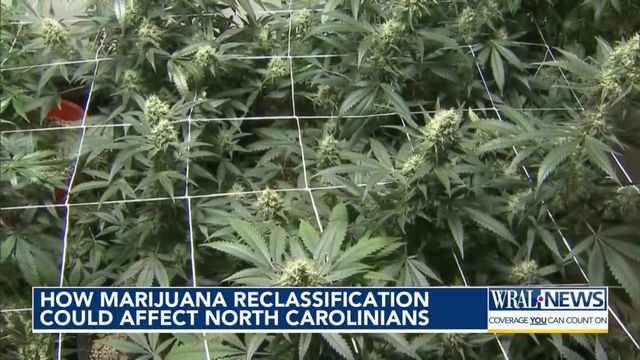How marijuana reclassification could affect North Carolinians
The Associated Press reports that the DEA will move to reclassify the drug to Schedule III - alongside Ketamine and Tylenol with codeine, which the DEA considers as drugs with a lower risk of abuse.
Posted — UpdatedMarijuana could soon be legally considered a lower-risk drug.
“What it should do is send a very strong indicator to the people of North Carolina, to our legislators, to our district attorneys and law enforcement...that there is no longer an appetite for criminalizing this kind of behavior,” said Dawn Blagrove, the executive director of Emancipate NC.
However, for people involved in the criminal justice system for those charges, Blagrove says this change alone will not get people out of it – even if the proposal is approved.
“Unfortunately, the reclassification will not do much for people who have already been involved in the system,” she explained.
Blagrove does hope the reclassification would encourage North Carolina lawmakers to follow suit, saying it would have a larger impact on its residents.
“When we see this kind of major reassessment of the harm and criminality of a substance like marijuana, is it imperative that the state follow suit,” she said.
Scott Chipman, the vice president of Americans Against Legalizing Marijuana, disagrees.
“Both the FDA and the DEA have had positions in the past that marijuana was a dangerous drug. It's only gotten more dangerous,” he said.
Chipman explains that the increased access and lack of education contribute to that danger. Therefore, he said his organization plans to ‘fight this.’
“We're going to argue that the DEA and the FDA go back to the same conclusions that they had previously made about marijuana,” he said. “They've made no arguments on why those original conclusions were wrong. They've only been just allowing political pressure to change their mind.”
Tess Medlin, the chief operating officer at the Hemp Store in Raleigh, believes this reclassification could be the source of more education.
“Because it has been classified as a Schedule I drug, it's removed the option for people to research the product on human trials,” she said. “This is something that opens up the ability for research to be done.”
Both Medlin and Blagrove said they hope this shift pushes North Carolina towards legalization.
“It's time for North Carolina to move to a place where it is in line with the rest of the country as far as legalizing marijuana and using marijuana,” Blagrove said. “The smell of marijuana is used as a pretense to stop and harass Black and Brown people all over North Carolina...If it were legalized, that smell would no longer give law enforcement officers a carte-blanche right to terrorize folks in Black communities.”
If the state were to follow suit, she said it would also change the way people were prosecuted, if at all.
“It would make it not worth the effort for law enforcement officers or district attorneys to prosecute these types of charges,” she explained.
The DEA will need to take public comment on the plan and an administrative judge will need to review it – before the agency can publish the rule. It would not legalize marijuana outright for recreational use.
The Cannabis Administration and Opportunity Act would remove cannabis from the list of federally controlled substances and give states the option to create their laws.
Senate leader Chuck Schumer introduced the bill and has 18 senators cosponsoring it.
Related Topics
Copyright 2024 by Capitol Broadcasting Company. All rights reserved. This material may not be published, broadcast, rewritten or redistributed.






